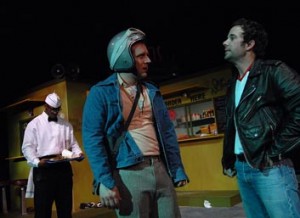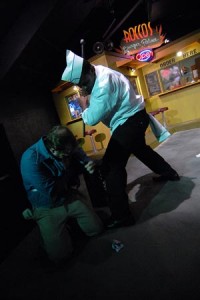
A brief news clipping reporting the aftermath of a crime in 1980s Apartheid-ruled South Africa inspired renowned playwright Paul Slabolepszy to imagine the 90 minutes which might have led up to it. The harrowing result, Saturday Night At The Palace, had its Cape Town premiere at a time when it was illegal for black and white actors even to appear on stage together.
Six years ago, Slabolepszy’s play marked the auspicious debut of what was to become one of L.A.’s preeminent 99-seat theater companies, The Furious. To mark their 6th anniversary, director Dámaso Rodriguez and company have remounted their much raved-about original production with its original cast and crew intact … to superb effect. It is riveting, disturbing, and thought-provoking must-see theater.
It’s just another Saturday night at a run-down roadhouse somewhere in the outskirts of Johannesburg, and a black South African named September (Sean Blakemore) is closing up for the night, doing cleanup and dancing along to pop music on the radio. He’s gone back inside the hotdog/burger joint when a pair of young white men arrive on their way home from a soccer match, one of them pushing a motorcycle. It becomes quite clear early on that Vince (Shawn Lee) is the alpha male of the two. His pal Forsie’s (Eric Pargac) complaint that “you haven’t even heard a word I said” is hardly surprising as Forsie does tend to run on at the mouth a bit. The way Vince attacks the “tickey box” (public pay phone) when it swallows his money reveals a young tough with a very short fuse. Just how short this fuse is and the violence that it will provoke is at the heart of Saturday Night.
At first, though, Slabolepszy allows us to get to know Vince and Forsie a bit. Vince has gotten a letter which he’s afraid to open, fearing that it is a call for military service. In 1982 South Africa, “they’ll be calling up the cripples soon,” he informs us. It is in fact a notice from the telephone company that their phone has been disconnected, just another entry in the string of bad luck which seems to follow Vince wherever he goes.
September emerges from the roadhouse, expressing interest in buying Vince’s bike. He’s about to go visit his wife for the first time in two years, a separation not uncommon in the South Africa of the time, and the bike would be useful. Meanwhile, Forsie is fascinated to learn that September is Zulu, and even tries to practice the few Zulu words he knows, which turn out not to be Zulu at all. To September’s amusement, Forsie even attempts his own “tribal” dance, causing the black man to joke, “What’s wrong with your feet?” This light mood will soon turn considerably darker.
Meanwhile, we learn more about the nature of Forsie’s friendship with Vince, who taunts Forsie that “it’s out of the goodness of my heart that you’ve got any social life at all.” Forsie is clearly the follower, Vince the one in control. Poor Forsie can only dream of someday saving a woman’s life so that she’ll be indebted to him always. Right now he’s fixated on one particular girl, asking Vince’s advice on how he should go about asking her out. Vince is, after all, the one who’s successful with women. “I could write a book. The Standards Of Courting, by Vince,” he boasts.
Vince is soon taunting September, stealing his keys, demanding that the black man cook them up a snack, despite September’s protestations that the shop is closed. After Vince loses control and starts to attack the trash cans, Forsie declares, “You never know when to stop!” Prophetic words, these.
Forsie suggests, not for the first time, that Vince get a job in the hospital with him. No way, replies Vince. “You not only do kaffirs’ work, you work beside them.” (Kaffir is the ugly Afrikaans equivalent of the n-word and used frequently in the play.) Vince would much rather rob the roadhouse. “One more time and it’s 12 months,” cautions Forsie, but once Vince gets an idea in his head, he won’t let it go, and things will soon spiral very much out of anyone’s control.
As much as history books can discuss Apartheid, the system of racial segregation that was law in South Africa for many decades, nothing can bring home its evils more powerfully and effectively than live theater. Both September and Vince are victims of institutionalized racism. September is stuck in menial labor, separated from his wife and child, and forced to endure the taunts of a man half his size. Vince is filled with hatred for an entire race, whom he blames for “taking all our jobs.” When September informs Vince and Forsie that he won’t cook for them, the shop is closed, Vince rages to Forsie, “Can’t you see that ten years ago that bloke would have been out here serving us!” Apartheid has victimized Vince’s entire family, and blacks are taking the blame for the horrendous childhood which has shaped the monster who slowly reveals himself in front of our eyes.
Reprising their original 2002 roles, Blakemore, Lee, and Pargac give performances that are sure to be remembered among the year’s best. To begin with, there are the accents, impeccably rendered, which allow these three Americans to disappear inside South African skins. Gone are any traces of the trio of actors who appeared at Thursday’s post-performance Q&A, so much so that it was startling to hear them speak in their own voices having thoroughly believed them as South Africans over the preceding ninety minutes.
Blakemore brings strength and great dignity to September, a man who knows that he must not fight back or risk losing everything. It is a heartbreaking, unforgettable performance. Pargac is perfection as Forsie, for whom running off at the mouth is a substitute for taking action. As much as one feels anger and indignation at Vince’s out-of-control violence, Forsie’s passivity is equally frustrating. Pargac’s is a performance that makes one want to run on stage and slap Forsie into action, another in a string of fine ones from this excellent young actor. Finally there is Lee, recent deserved winner of the LADCC Best Actor for Canned Peaches In Tomatoes, proving himself once again one of our most electric talents, inspiring an audience hatred that defies the logic of “it’s only a performance.” Still, Lee manages to show the wounded child beneath the surface of the violent monster in an absolutely brilliant performance.
Kudos, as always, to Dámaso Rodriguez, whose direction combines attention to both character and physical action, resulting in ninety minutes which move like a speeding train hurtling towards disaster.
Melissa Teoh’s detailed set is a perfect recreation of a run-down roadside diner, enhanced by Christie Wright’s superb lighting. Cricket S. Myers’ sound design is almost a character in itself, in its use of music, drum beats, and night sounds.
Joel Goldes, Jonathon Kassel, Caseline Kunene, and Bridgette Ramafodi worked with the three actors on dialect and language, and the results they achieved are almost too good. If there’s anything to nitpick about, it’s that the accents and use of non-English are so authentic that considerable dialog is lost, and this comment comes from an ESL teacher who has spent the past three plus decades figuring out what non-native speakers of English are saying. I can only imagine how much more difficult it must have been for those in the audience used only to American English.
But no matter. Even with chunks of dialog lost, what remains is more than enough. Saturday Night At The Palace provides both education and entertainment (albeit of a darker nature), and an always needed reminder that racism, bigotry, and scapegoating can reduce human beings to animals. Even in our “enlightened” America of 2008, this is a message that bears repeating. Don’t miss Saturday Night At The Palace, but prepare yourself for an emotionally exhausting ride.
Pasadena Playhouse Carrie Hamilton Theatre, 39 S. El Molino Ave, Pasadena.
www.furioustheatre.org
–Steven Stanley
May 1, 2008
Photos: Anthony Masters




 Since 2007, Steven Stanley's StageSceneLA.com has spotlighted the best in Southern California theater via reviews, interviews, and its annual StageSceneLA Scenies.
Since 2007, Steven Stanley's StageSceneLA.com has spotlighted the best in Southern California theater via reviews, interviews, and its annual StageSceneLA Scenies.







 COPYRIGHT 2024 STEVEN STANLEY :: DESIGN BY
COPYRIGHT 2024 STEVEN STANLEY :: DESIGN BY